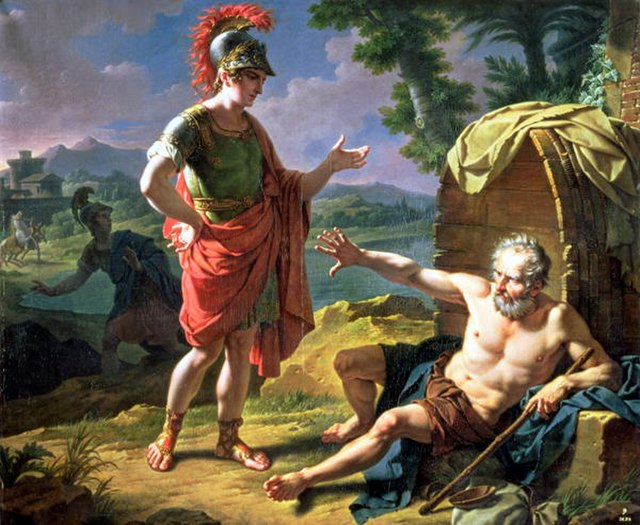
Diogenes really was quite strange. One fact I didn't mention about him on the homepage is that he would even masturbate in public. He was certainly a cynic, but in the original sense of the word. He didn't have a higher ideal to give instead of honor, riches, etc. He basically approximated a hedonist. The story that best represents Diogenes is probably his interaction with Alexander the Great. He was said to be on the streets, sunbathing, when Alexander approached him. He was fascinated by Diogenes and asked him, "is there anything I can do for you?". "Yes", he replied, "stand a little out of my sun."
Alexander was quite impressed, and commented, "truly, if I was not Alexander, I would be Diogenes."
Another story says that Alexander approached Diogenes and he was looking through a pile of bones. Alexander asked him what he was doing. "I am looking for the bones of your father," he said, "but cannot distinguish them from the bones of a slave". Suitingly, Plutarch records that the two of them died on the same day.
Symbolically, Diogenes reminds me of a backwoods hermit who lives off the land. But really Diogenes was even freer than that; he refused essentially all of his posessions, even more so than later Christian ascetics.
He is like a George Carlin figure, except Diogenes would even look down on George Carlin. He is basically a geezer, but I truly believe he defies these labels because he seems to reject labels all together.
Diogenes does not live up to the legacy of other "virtuous pagans", what with his masturbation habits, urinating on people, and just general contempt for humanity, but he was still impressively self-consistent and stalwart in his beliefs. He still holds a place in my heart as a philosopher who I can identify much more with: eye-rolling, sneering, and sarcastic.
Diogenes might have not known what did matter, but he certainly knew what did not.
I do not wish to be Diogenes. However: I do believe that I - as well as many other people - can say, like Alexander, "truly, if I were not myself, I would be Diogenes."